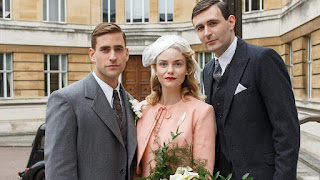 |
| Julian Morris and Vanessa Redgrave in a scene from "Man in an Orange Shirt" |
The British film “Man in an Orange Shirt”, is one example of how a poignantly written romance drama, performed by gifted actors, all of whom have been deftly directed by their countryman Michael Samuelson, can take a small, intimate film dealing with the highly emotional and radio-active subject of homosexuality, then turn it into a compelling and relevant movie about England’s punitive homosexuality laws that have existed for decades is worthy of one’s attention regardless of one’s sexual identity or preference.
The British government has been slow in coming to the party of legally joining the rest of Western society in realizing that all people have inalienable rights as human beings to live, love, and marry whomever they please. The English “Gross Indecency” laws concerning males – like those that ensnared and ended the career of famed playwright and author Oscar Wilde at the end of the 19th century – were finally decriminalized and removed from the law statutes with Parliament’s passage of the Sexual Offenses Act of 1967.
In a sidebar digression it might be interesting to share some statistical clarity for context and perspective of the film written by novelist Patrick Gale, based in part on his novel and his family’s history. The UK is a country of some 53 million people. According to 2018 government records, only 6 per cent of the population identifies as LGBT. In America a country with 328 million citizens, the LGBT community consists of only 4.5 per cent of individuals 16 years and older who so identify; according a May 5th Gallup Poll taken in 2018. I believe it’s a safe bet to say that the gay population is not planning on taking over the world.
The film “Man in an Orange Shirt” was originally produced as a two-part British TV miniseries. But for American audiences, the two interwoven stories of love relationships over a period of two generations, have been joined into a single film presentation that screened on PBS stations across the country. I reviewed it earlier this month.
 |
| Oliver Jackson-Cohen and James McArdle portray star-crossed lovers in "Man in an Orange Shirt" |
Once back in civilian life, Michael and Thomas have been meeting secretly, which places a huge strain on Michael’s marriage to young Flora, played by Joanna Vanderham (later to be played by Vanessa Redgrave). From the day Flora discovers love letters from Michael to Thomas is the day Flora burns the letters signifying that their marriage has changed to that of a brother-sister like relationship. Betrayal produces emotions that are difficult to control. Beware the woman scorned…
 |
| Oliver Jackson-Cohen, Joanna Vanderham, and James McArdle in "Man in an Orange Shirt" |
The real beauty of this engaging, powerful and achingly poignant film lies in the performances of its sublime ensemble cast. They’re experienced, talented, and spot-on in their portrayals, and all are in the thrall of the great 80-year-old (when she made the film) Vanessa Redgrave. The great ones never seem to lose that special gift of star quality. “Man in an Orange Shirt” should be on your “must-see” list so keep checking your local TV listings for dates and times of its screening. Remember a great nation deserves great art. Support all the Arts.
No comments:
Post a Comment